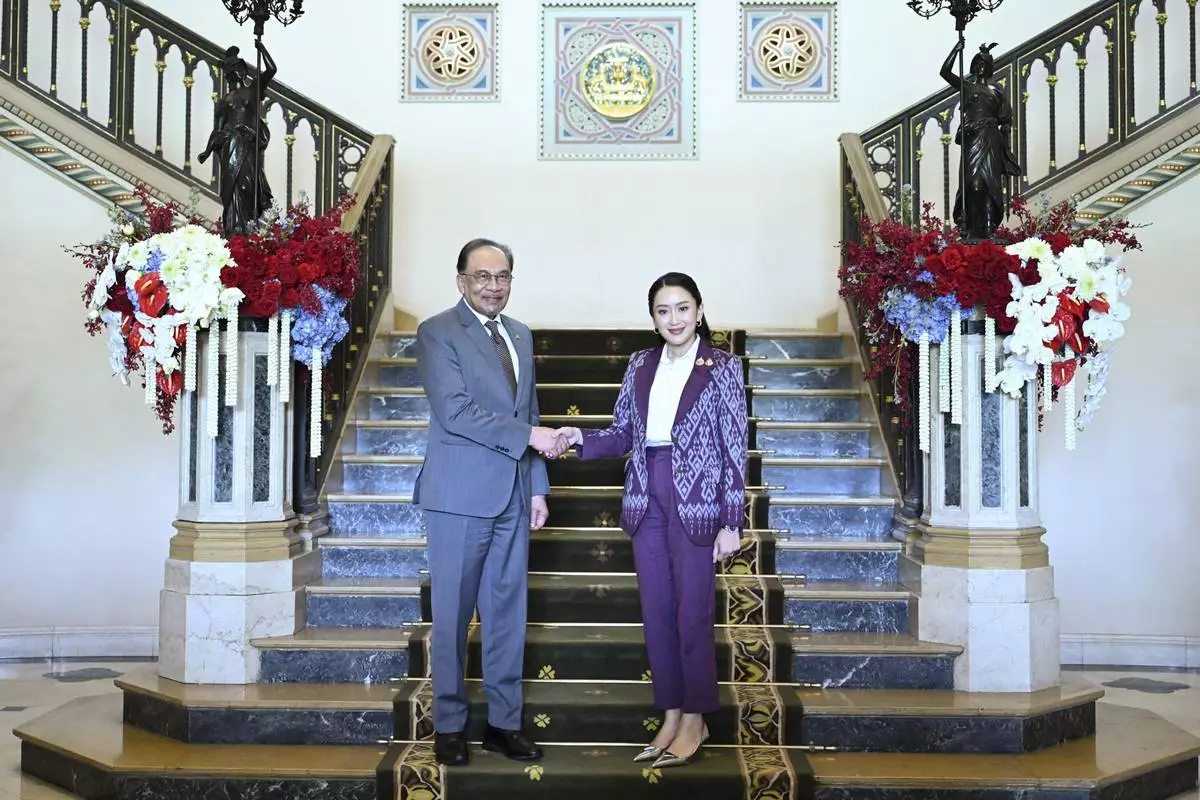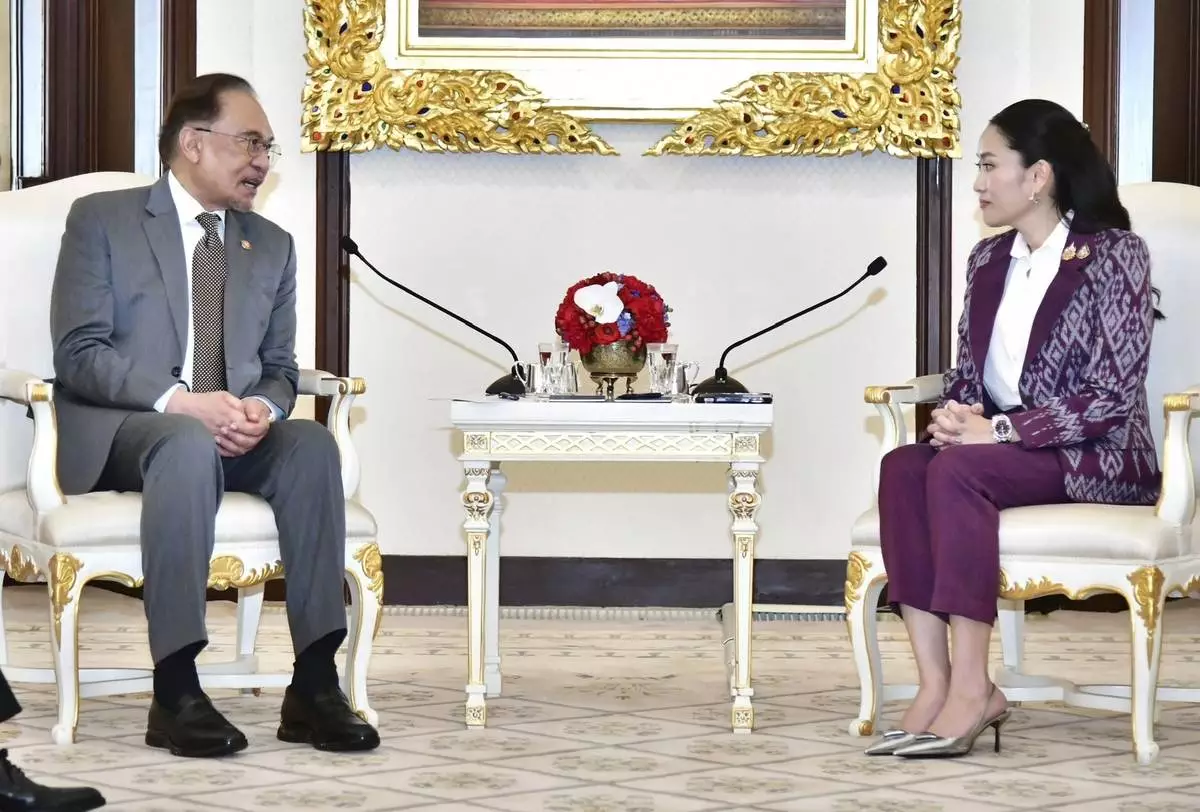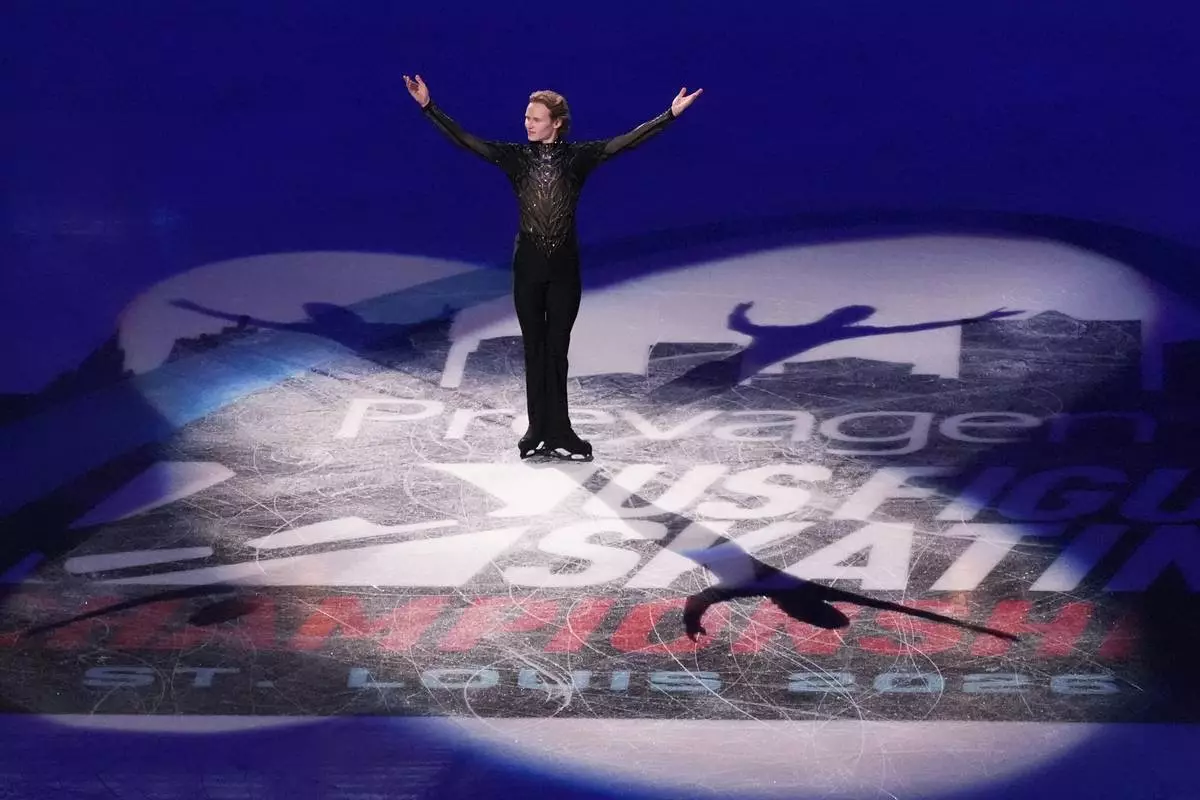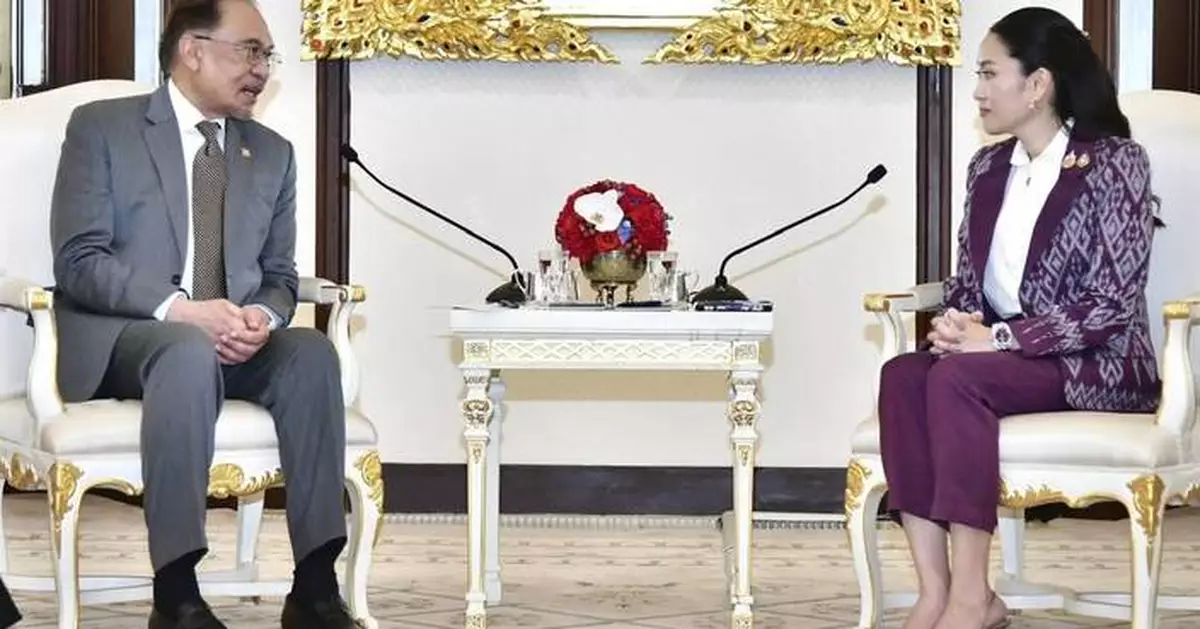BANGKOK (AP) — Malaysian Prime Minister Anwar Ibrahim and the leader of Myanmar’s military government, Senior Gen. Min Aung Hlaing, met in the Thai capital on Thursday for talks widely assumed to focus on efforts to restore peace in war-torn Myanmar.
Authorities had said the talks would focus on humanitarian assistance following the massive earthquake in March that devastated Myanmar, and promote the extension of a fragile ceasefire to facilitate aid delivery.
Anwar also met with Thai Prime Minister Paetongtarn Shinawatra, who said they discussed issues of bilateral interest and how nations in the region can respond to the new U.S. tariff policies.
Myanmar's state-run MRTV television reported Thursday night that Min Aung Hlaing and Anwar discussed post-quake aid by the Association of Southeast Asian Nations and Myanmar-ASEAN cooperation at a meeting also attended by Thailand's former Prime Minister Thaksin Shinawatra.
But the unusual top-level contacts and rare trip abroad by Min Aung Hlaing, as well as the involvement of Thaksin, suggested a more substantive political agenda. Thaksin is an informal chief advisor to Anwar, current chairman of ASEAN.
Thaksin, who is the father of current Prime Minister Paetongtarn and seen as pulling the strings of her government, has focused on back-channel diplomacy to end Myanmar’s conflict.
Anwar posted on the X social platform that he had met Min Aung Hlaing on Thursday evening for “a frank and constructive discussion, focused on the urgent humanitarian needs of the Myanmar people including the immediate deployment of a field hospital as well as the importance of returning the country to normalcy.”
He added that on Friday he would meet with representatives of the shadow National Unity Government, Myanmar's leading resistance group.
Myanmar has been in turmoil since the military overthrew Aung San Suu Kyi’s elected government in February 2021, leading to armed conflict across the country.
The United Nations last week warned that damage caused by the March 28 quake will cause food shortages and a possible public health emergency, exacerbating the existing humanitarian crisis caused by the civil war that had already displaced more than 3 million people.
Maj. Gen. Zaw Min Tun, a spokesperson for Myanmar’s military government, said on Wednesday that the death toll from the 7.7 magnitude quake had reached 3,725, with 5,106 injured.
Ahead of his Bangkok trip, Anwar announced that he would push for an extension of the soon-to-expire ceasefires declared by the Myanmar army and its foes, pro-democracy resistance forces and ethnic minority armed groups, to ease aid efforts. There was no immediate announcement of such a development.
The U.N. Human Rights Office has accused the military of continuing airstrikes and artillery assaults after the earthquake.
However, some experts have suggested the current ceasefires could turn into a broader peacemaking effort where others have failed.
The 10-member ASEAN, to which Myanmar belongs, agreed soon after the army’s 2021 takeover on a peace plan, but Myanmar’s military government failed to implement it. The regional bloc has since largely barred Min Aung Hlaing and senior members of his ruling council from its high-level meetings.
Min Aung Hlaing’s attendance at the BIMSTEC summit of leaders of nations in Bangkok earlier this month was a rare exception to his limited travel and drew criticism for legitimizing his rule. Thailand has been accused by the opponents of military rule in Myanmar of failing to pressure the generals to make any concessions toward a fair peace.
Thaksin claimed to Thai media that he urged Min Aung Hlaing on the sidelines of the BIMSTEC summit to engage in peace talks with resistance forces. He has said he met separately with ethnic minority groups fighting against the military.
Critics of the military government charge that Min Aung Hlaing’s visit to Bangkok will do more to legitimize the military government that ensure needed aid.
It risks “legitimizing the illegal military coup and reinforcing the regime responsible” for the people's suffering, said a joint statement Wednesday by the opposition’s National Unity Government and other groups battling military rule.
Opponents of the army accuse it of weaponizing aid, and say foreign humanitarian assistance should be delivered outside military channels.

In this photo released by the Thailand's Government Spokesman Office, Malaysian Prime Minister Anwar Ibrahim, left, shakes hands with Thailand's Prime Minister Paetongtarn Shinawatra, right, in Bangkok, Thailand, Thursday, April 17, 2025. (Thailand's Government Spokesman Office via AP)

In this photo released by the Thailand's Government Spokesman Office, Malaysian Prime Minister Anwar Ibrahim, left, meets Thailand's Prime Minister Paetongtarn Shinawatra, right, at the Government house in Bangkok, Thailand, Thursday, April 17, 2025. (Thailand's Government Spokesman Office via AP)
ST. LOUIS (AP) — World champions Ilia Malinin and the ice dance duo of Madison Chock and Evan Bates will anchor one of the strongest U.S. Figure Skating teams in history when they head to Italy for the Milan Cortina Olympics in less than a month.
Malinin, fresh off his fourth straight national title, will be the prohibitive favorite to follow in the footsteps of Nathan Chen by delivering another men's gold medal for the American squad when he steps on the ice at the Milano Ice Skating Arena.
Chock and Bates, who won their record-setting seventh U.S. title Saturday night, also will be among the Olympic favorites, as will world champion Alysa Liu and women's teammate Amber Glenn, fresh off her third consecutive national title.
U.S. Figure Skating announced its full squad of 16 athletes for the Winter Games during a made-for-TV celebration Sunday.
"I'm just so excited for the Olympic spirit, the Olympic environment," Malinin said. “Hopefully go for that Olympic gold.”
Malinin will be joined on the men's side by Andrew Torgashev, the all-or-nothing 24-year-old from Coral Springs, Florida, and Maxim Naumov, the 24-year-old from Simsbury, Connecticut, who fulfilled the hopes of his late parents by making the Olympic team.
Vadim Naumov and Evgenia Shishkova were returning from a talent camp in Kansas when their American Airlines flight collided with a military helicopter and crashed into the icy Potomac River in January 2025. One of the last conversations they had with their son was about what it would take for him to follow in their footsteps by becoming an Olympian.
“We absolutely did it,” Naumov said. “Every day, year after year, we talked about the Olympics. It means so much in our family. It's what I've been thinking about since I was 5 years old, before I even know what to think. I can't put this into words.”
Chock and Bates helped the Americans win team gold at the Beijing Games four years ago, but they finished fourth — one spot out of the medals — in the ice dance competition. They have hardly finished anywhere but first in the years since, winning three consecutive world championships and the gold medal at three straight Grand Prix Finals.
U.S. silver medalists Emilea Zingas and Vadym Kolesnik also made the dance team, as did the Canadian-born Christina Carreira, who became eligible for the Olympics in November when her American citizenship came through, and Anthony Ponomarenko.
Liu was picked for her second Olympic team after briefly retiring following the Beijing Games. She had been burned out by years of practice and competing, but stepping away seemed to rejuvenate the 20-year-old from Clovis, California, and she returned to win the first world title by an American since Kimmie Meissner stood atop the podium two decades ago.
Now, the avant-garde Liu will be trying to help the U.S. win its first women's medal since Sasha Cohen in Turin in 2006, and perhaps the first gold medal since Sarah Hughes triumphed four years earlier at the Salt Lake City Games.
Her biggest competition, besides a powerful Japanese contingent, could come from her own teammates: Glenn, a first-time Olympian, has been nearly unbeatable the past two years, while 18-year-old Isabeau Levito is a former world silver medalist.
"This was my goal and my dream and it just feels so special that it came true,” said Levito, whose mother is originally from Milan.
The two pairs spots went to Ellie Kam and Danny O'Shea, the U.S. silver medalists, and the team of Emily Chan and Spencer Howe.
The top American pairs team, two-time reigning U.S. champions Alisa Efimova and Misha Mitrofanov, were hoping that the Finnish-born Efimova would get her citizenship approved in time to compete in Italy. But despite efforts by the Skating Club of Boston, where they train, and the help of their U.S. senators, she did not receive her passport by the selection deadline.
“The importance and magnitude of selecting an Olympic team is one of the most important milestones in an athlete's life,” U.S. Figure Skating CEO Matt Farrell said, "and it has such an impact, and while there are sometimes rules, there is also a human element to this that we really have to take into account as we make decisions and what's best going forward from a selection process.
“Sometimes these aren't easy," Farrell said, “and this is not the fun part.”
The fun is just beginning, though, for the 16 athletes picked for the powerful American team.
AP Olympics: https://apnews.com/hub/milan-cortina-2026-winter-olympics

Amber Glenn competes during the women's free skating competition at the U.S. Figure Skating Championships, Friday, Jan. 9, 2026, in St. Louis. (AP Photo/Stephanie Scarbrough)

Alysa Liu skates during the "Making Team USA" performance at the U.S. Figure Skating Championships, Sunday, Jan. 11, 2026, in St. Louis. (AP Photo/Stephanie Scarbrough)

Maxim Naumov skates during the "Making Team USA" performance at the U.S. Figure Skating Championships, Sunday, Jan. 11, 2026, in St. Louis. (AP Photo/Stephanie Scarbrough)

Madison Chock and Evan Bates skate during the "Making the Team" performance at the U.S. Figure Skating Championships, Sunday, Jan. 11, 2026, in St. Louis. (AP Photo/Stephanie Scarbrough)

Gold medalist Ilia Malinin arrives for the metal ceremony after the men's free skate competition at the U.S. Figure Skating Championships, Saturday, Jan. 10, 2026, in St. Louis. (AP Photo/Jeff Roberson)
















